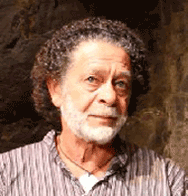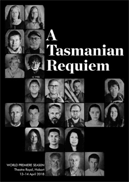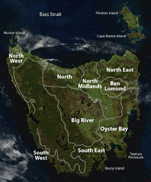Jim Everett – November 25 2018
 Jim Everett, or puralia meenamatta meaning ‘paperbark’ in palawa kani, the revived language of Aborigines in lutruwita (Tasmania), is a playwright, poet and political activist. Born on Flinders Island in 1942, he is a plangermairreenner man of the Ben Lomond people, a clan of the Cape Portland nation in north-east Tasmania. After leaving school at 14, Jim spent 15 years at sea as a fisherman and merchant seaman, then 3 years in the Australian Regular Army. He has travelled extensively through Australia visiting many remote Aboriginal communities and has over 50 years’ formal involvement in the Aboriginal Struggle. Jim’s career has included working for the Office of Aboriginal Affairs, Department for Community Welfare; Office of Aboriginal Affairs, Department of Premier and Cabinet; the Tasmanian Aboriginal Land Council; and Office of Indigenous Policy Coordination, Indigenous Coordination Centre, Hobart. His other published play, A Cultural Lesson, an hilarious yet deeply serious examination of what Australian legislation might look like if the roles were reversed, is set in 2028 but was written in 1987 when he worked as State Secretary of the Tasmanian Aboriginal Centre. Jim has lectured in Aboriginal heritage, culture and history at the University of Tasmania and tutored at TAFE. He has produced radio and television programs, educational videos and theatre productions and was a Writer-in-Residence at Risdon Cove in Tasmania. Jim began writing poetry at an early age and went on to also write plays, political papers and short stories. His work has been published in 10 major anthologies. He lives on Cape Barren Island, in the Furneaux Group of Islands, north-east Tasmania, writing and operating his consultancy business.
Jim Everett, or puralia meenamatta meaning ‘paperbark’ in palawa kani, the revived language of Aborigines in lutruwita (Tasmania), is a playwright, poet and political activist. Born on Flinders Island in 1942, he is a plangermairreenner man of the Ben Lomond people, a clan of the Cape Portland nation in north-east Tasmania. After leaving school at 14, Jim spent 15 years at sea as a fisherman and merchant seaman, then 3 years in the Australian Regular Army. He has travelled extensively through Australia visiting many remote Aboriginal communities and has over 50 years’ formal involvement in the Aboriginal Struggle. Jim’s career has included working for the Office of Aboriginal Affairs, Department for Community Welfare; Office of Aboriginal Affairs, Department of Premier and Cabinet; the Tasmanian Aboriginal Land Council; and Office of Indigenous Policy Coordination, Indigenous Coordination Centre, Hobart. His other published play, A Cultural Lesson, an hilarious yet deeply serious examination of what Australian legislation might look like if the roles were reversed, is set in 2028 but was written in 1987 when he worked as State Secretary of the Tasmanian Aboriginal Centre. Jim has lectured in Aboriginal heritage, culture and history at the University of Tasmania and tutored at TAFE. He has produced radio and television programs, educational videos and theatre productions and was a Writer-in-Residence at Risdon Cove in Tasmania. Jim began writing poetry at an early age and went on to also write plays, political papers and short stories. His work has been published in 10 major anthologies. He lives on Cape Barren Island, in the Furneaux Group of Islands, north-east Tasmania, writing and operating his consultancy business.
 A Tasmanian Requiem (Co- writers – Greg Lehman and Frances Butler; Composer – Helen Thomson)
A Tasmanian Requiem (Co- writers – Greg Lehman and Frances Butler; Composer – Helen Thomson)
Royal Theatre Hobart Premiere April 2018
1hr 25mins; 7 voices & brass quintet
Audience age: 15 years+
“This groundbreaking collaboration between Aboriginal and non-Aboriginal artists acknowledges the impact of frontier conflict and the strength, beauty and resilience of Tasmanian Aboriginal culture. It is at once disturbing and uplifting, a musical gift for a shared future.” – Theatre Royal, Hobart
“Regarded an act of genocide, the atrocities British settler-invaders committed against indigenous Tasmanians are referred to as the Black War. This saw the destruction of more than 90 per cent of the island’s original inhabitants. Part of the intention of the work is simply to bring this horrific past into the light …. It is a positive step along the path of acknowledgement and healing.” – Joel Roberts, www.cutcommonmag.com

Photo: Martyman, Wikepedia
We Are Survivors
Australian Script Centre, 1984
50 minutes; 3 female, 7 male
Audience age: Young adult, adult
Everett was so moved by seeing Jack Davis’ The Dreamers that he went home and wrote this Tasmanian response to it in a single afternoon. We Are Survivors is a raw and clear-eyed portrayal of the circumstances facing Tasmanian Aborigines post WWII and the forces which shaped their emerging political activism.
“We Are Survivors tells us so much about Tasmanian Aboriginal family dynamics, the concerns of the people and their view of the place that history has brought them to. The play recreates the ways of talking and of relating that these people share, such a distinct and important Indigenous people …. [It] portrays a Tasmanian Aboriginal family group in all of their ordinariness. A statement of difference and a statement of survival. This is no performance of Aboriginal identity; this is the real thing.” – Victoria Grieves, JEASA
